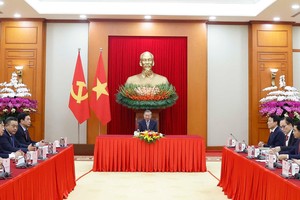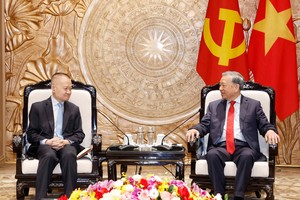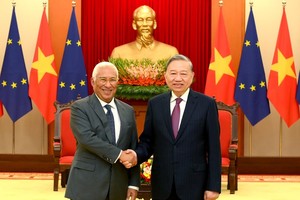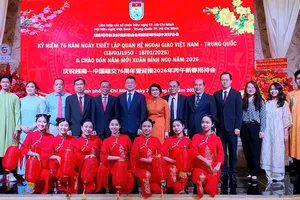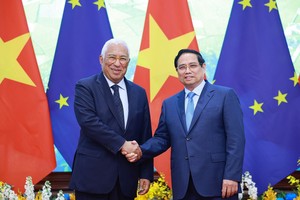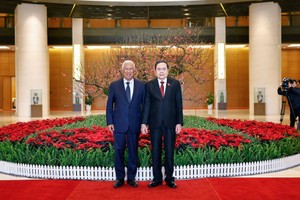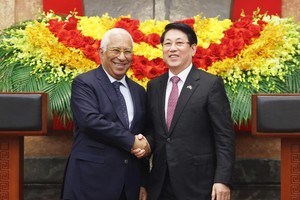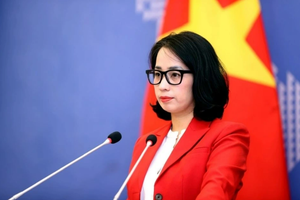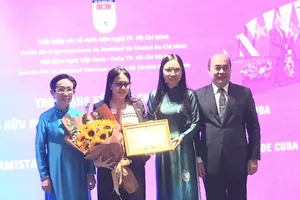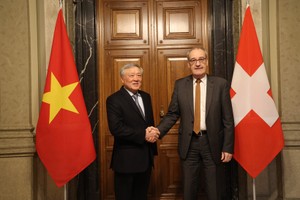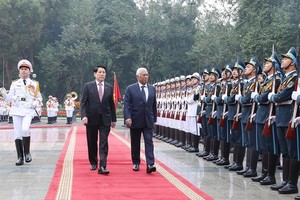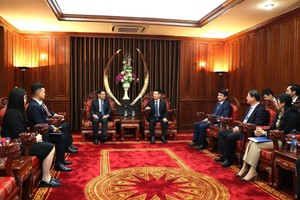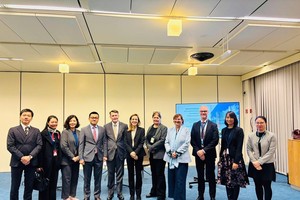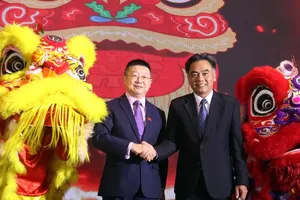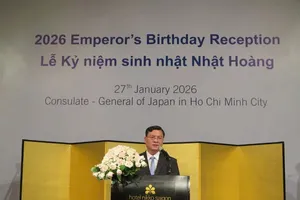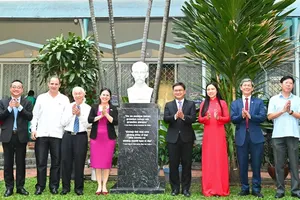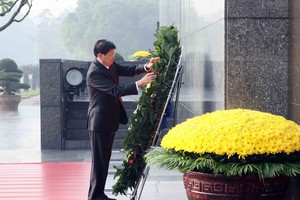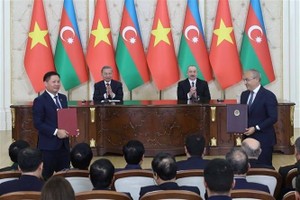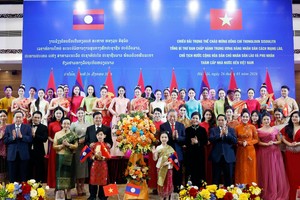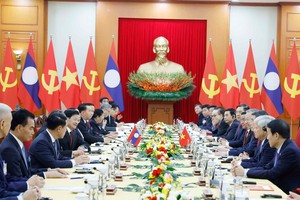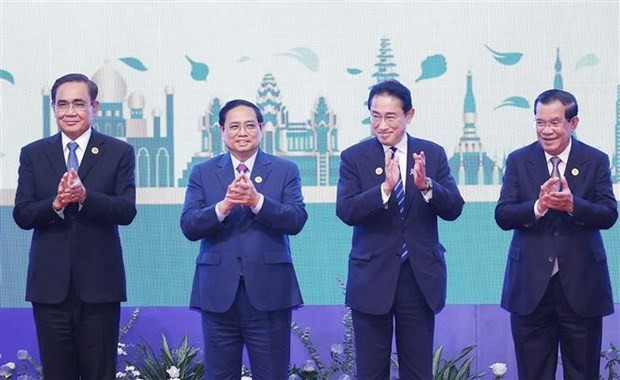 Vietnamese PM Pham Minh Chinh (second from left), Japanese PM Kishida Fumio (second from right) and other leaders at the 25th ASEAN - Japan Summit in Phnom Penh, Cambodia, on November 12. (Photo: VNA)
Vietnamese PM Pham Minh Chinh (second from left), Japanese PM Kishida Fumio (second from right) and other leaders at the 25th ASEAN - Japan Summit in Phnom Penh, Cambodia, on November 12. (Photo: VNA)
At the events, leaders of the Association of Southeast Asian Nations (ASEAN) and the partners reviewed bilateral cooperation in the recent past, set out development orientations for their relations, and discussed regional and international issues of common concern.
Japan, the US, and Canada stressed that they treasure relations with ASEAN; pledged to continue assisting the bloc in the community building and regional integration; supported ASEAN’s centrality; and promised to make responsible and constructive contributions to ASEAN’s efforts to effectively respond to common challenges and promote the building of an open, inclusive, and transparent regional architecture that upholds international law.
At the 25th ASEAN - Japan Summit, the ASEAN leaders and Japanese PM Kishida Fumio applauded the strides in bilateral relations, noting that economic cooperation is a bright spot in the region’s recovery and sustainable development efforts.
PM Kishida emphasized that Japan attaches importance to the almost-five-decade partnership with ASEAN; backs the association’s solidarity and centrality in the regional architecture as well as the ASEAN Outlook on the Indo-Pacific (AOIP); and pledges to continue active participation in and effective contributions to the ASEAN-led mechanisms.
PM Chinh highly valued the importance of ASEAN’s relations with Japan – the first partner of the bloc, noting that their close and fruitful ties have become a role model of ASEAN’s cooperation with partners and substantially contributed to peace, security, stability, and prosperous development of each side and the region as a whole.
Regarding orientations for bilateral relations in the coming time, he stressed that economic, trade, and investment partnerships should be the basis, momentum, and priority amid the post-pandemic recovery.
The governments of the ASEAN countries have been creating optimal conditions for Japanese enterprises and investors to stabilize and expand production and business activities, especially in supporting industries and high-tech industry. They also hoped that Japan will facilitate Vietnam and ASEAN’s export of farm produce, and the diversification of supply chains, he added.
Proposing the two sides boost green, digital, and circular economy development, he expressed his hope that Japan will help ASEAN step up just energy transition, effectively respond to climate change, develop strategic infrastructure, reinforce trading connectivity, and guarantee financial, energy, and food security.
The Vietnamese leader also recommended Japan and ASEAN to promote people-to-people ties, cultural exchanges, and tourism; pay more attention to high-quality human resource development; and provide favorable conditions for workers and apprentices from Vietnam and other ASEAN countries to work in the Northeast Asian nation.
Japan, the US, and Canada stressed that they treasure relations with ASEAN; pledged to continue assisting the bloc in the community building and regional integration; supported ASEAN’s centrality; and promised to make responsible and constructive contributions to ASEAN’s efforts to effectively respond to common challenges and promote the building of an open, inclusive, and transparent regional architecture that upholds international law.
At the 25th ASEAN - Japan Summit, the ASEAN leaders and Japanese PM Kishida Fumio applauded the strides in bilateral relations, noting that economic cooperation is a bright spot in the region’s recovery and sustainable development efforts.
PM Kishida emphasized that Japan attaches importance to the almost-five-decade partnership with ASEAN; backs the association’s solidarity and centrality in the regional architecture as well as the ASEAN Outlook on the Indo-Pacific (AOIP); and pledges to continue active participation in and effective contributions to the ASEAN-led mechanisms.
PM Chinh highly valued the importance of ASEAN’s relations with Japan – the first partner of the bloc, noting that their close and fruitful ties have become a role model of ASEAN’s cooperation with partners and substantially contributed to peace, security, stability, and prosperous development of each side and the region as a whole.
Regarding orientations for bilateral relations in the coming time, he stressed that economic, trade, and investment partnerships should be the basis, momentum, and priority amid the post-pandemic recovery.
The governments of the ASEAN countries have been creating optimal conditions for Japanese enterprises and investors to stabilize and expand production and business activities, especially in supporting industries and high-tech industry. They also hoped that Japan will facilitate Vietnam and ASEAN’s export of farm produce, and the diversification of supply chains, he added.
Proposing the two sides boost green, digital, and circular economy development, he expressed his hope that Japan will help ASEAN step up just energy transition, effectively respond to climate change, develop strategic infrastructure, reinforce trading connectivity, and guarantee financial, energy, and food security.
The Vietnamese leader also recommended Japan and ASEAN to promote people-to-people ties, cultural exchanges, and tourism; pay more attention to high-quality human resource development; and provide favorable conditions for workers and apprentices from Vietnam and other ASEAN countries to work in the Northeast Asian nation.
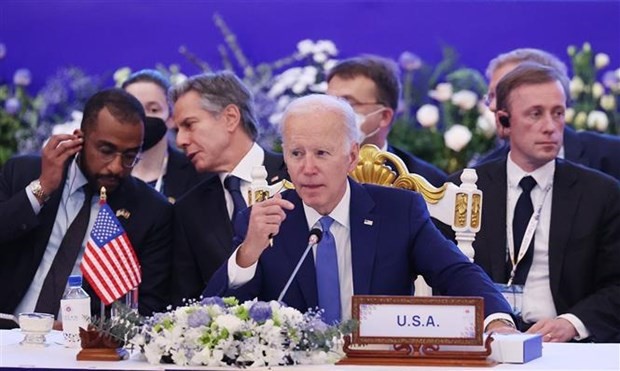 US President Joe Biden at the 10th ASEAN - US Summit on November 12. (Photo: VNA)
US President Joe Biden at the 10th ASEAN - US Summit on November 12. (Photo: VNA)
At the 10th ASEAN - US Summit, the ASEAN leaders and US President Joe Biden spoke highly of the bilateral partnership’s importance to regional and global peace, security, and prosperous development. On this occasion, they adopted a joint statement on the establishment of the comprehensive strategic partnership between the two sides. President Biden said the US attaches importance to its ties with ASEAN; supports the bloc’s centrality and the ASEAN Outlook on the Indo-Pacific; wants to work closely with ASEAN to step up the implementation of the freshly-established comprehensive strategic partnership, and vows to cooperate with the bloc to effectively respond to common challenges in the region and the world. He also announced an additional US$850 million in aid for the ASEAN region in 2023 to foster practical and effective cooperation between the two sides. Welcoming the US’s strong commitments to ASEAN, PM Chinh suggested that amid an economic downturn in the region and the world, the two sides should prioritize boosting bilateral trade and investment and speeding up post-pandemic sustainable recovery efforts. He underlined Vietnam’s consistent viewpoint that all the best possible measures will be taken to assist US investors and enterprises. PM Chinh proposed the US, with its position, role, prestige, experience, and resources, help facilitate ASEAN’s exports to its market and assist the bloc with economic restructuring and development of digital economy and e-commerce. The Vietnamese PM also highly evaluated the US’s important role and strong commitments to promoting international solidarity and multilateralism, and jointly devising global solutions to global issues. PM Chinh called on the US to increase assistance to ASEAN countries, including Vietnam, to improve medical resilience, epidemic response, and climate change adaptation while promoting green growth, including just energy transition. He also urged the US to continue helping the bloc with sustainable development in the Mekong sub-region via the Mekong-US Partnership, including strengthening vulnerable communities’ resilience in Vietnam’s Mekong Delta.
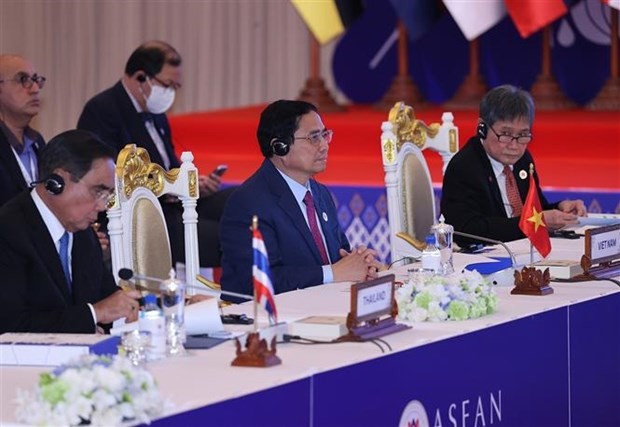 PM Pham Minh Chinh (center) at the ASEAN - Canada Commemorative Summit on November 12. (Photo: VNA)
PM Pham Minh Chinh (center) at the ASEAN - Canada Commemorative Summit on November 12. (Photo: VNA)
At the summit commemorating 45 years of ASEAN - Canada relations, the ASEAN leaders and Canadian PM Justin Trudeau lauded the encouraging outcomes obtained during the four and a half decades of dialogue and cooperation between the two sides. PM Trudeau affirmed that Canada is always a trustworthy partner of ASEAN and attaches importance to relations with the bloc. He noted ASEAN holds the central position in Canada’s Indo-Pacific Strategy, which will be announced soon, and that Canada wants to upgrade its ties with ASEAN to a strategic partnership. Highlighting the progress in economic and trade links, participating leaders shared the view that there remains much room for developing bilateral relations, and that in the short term, the two sides should focus on helping each other step up comprehensive recovery towards green and sustainable development. They agreed to continue coordinating in the pandemic combat; improve medical resilience; foster trade and investment connections; and strive to build an ASEAN - Canada free trade agreement (FTA) that brings practical benefits to both sides’ people and businesses; increase cooperation in the fight against terrorism and transnational crimes; and boost partnerships in education - training and high-quality human resource development, infrastructure development, science - technology, digital transformation, natural disaster management, environmental protection, climate change response, and development gap narrowing. In his remarks, PM Chinh voiced his support in principle for the upgrade of the ASEAN - Canada relations to a strategic partnership. He said the two sides should increase consultation, coordinate their stances on many important issues, and make more responsible contributions to the maintenance of regional and global peace, security, stability, and development. They should also further tap into their own potential and advantages to meet urgent needs, recover after the pandemic, and develop sustainably. The Vietnamese leader recommended that priority should be given to bolstering economic, trade, and investment ties, including effectively carrying out the Comprehensive and Progressive Agreement for Trans-Pacific Partnership (CPTPP) and boosting the FTA negotiations. He called on Canadian enterprises to invest more in ASEAN and assist firms of the bloc to engage in global supply chains. He also asked the North American nation to continue creating conditions for goods, including farm produce, aquatic products, and fruits from Vietnam and other ASEAN countries to enter its market. The PM also called for stronger collaboration in education - training, and for the Canadian Government’s continued provision of favorable conditions for people of the ASEAN countries, including Vietnam, to live, work, and study. Discussing the international and regional situation at these summits, the leaders of ASEAN and the partners emphasized the importance of maintaining and safeguarding peace, security, and stability in the region to create conditions for recovery and sustainable development efforts. The bloc asked the partners to support its principled stance on the East Sea and efforts to build an effective and practical code of conduct in the East Sea (COC) that is in line with international law and the 1982 United Nations Convention on the Law of the Sea (UNCLOS) to turn the East Sea into a sea of peace, stability, cooperation, and sustainable development. Japan, the US, and Canada continued voicing their support for ASEAN’s role and efforts to promote dialogue, reconciliation, and assistance for Myanmar to seek solutions to stabilize the situation. Expressing their concerns about complex developments on the Korean Peninsula, especially recent missile tests, the ASEAN leaders affirmed their advocacy for efforts to promote peace, stability, and complete denuclearization on the peninsula. They stressed the bloc’s readiness to build and create favorable conditions for dialogue among the parties concerned at the ASEAN-led mechanisms.
